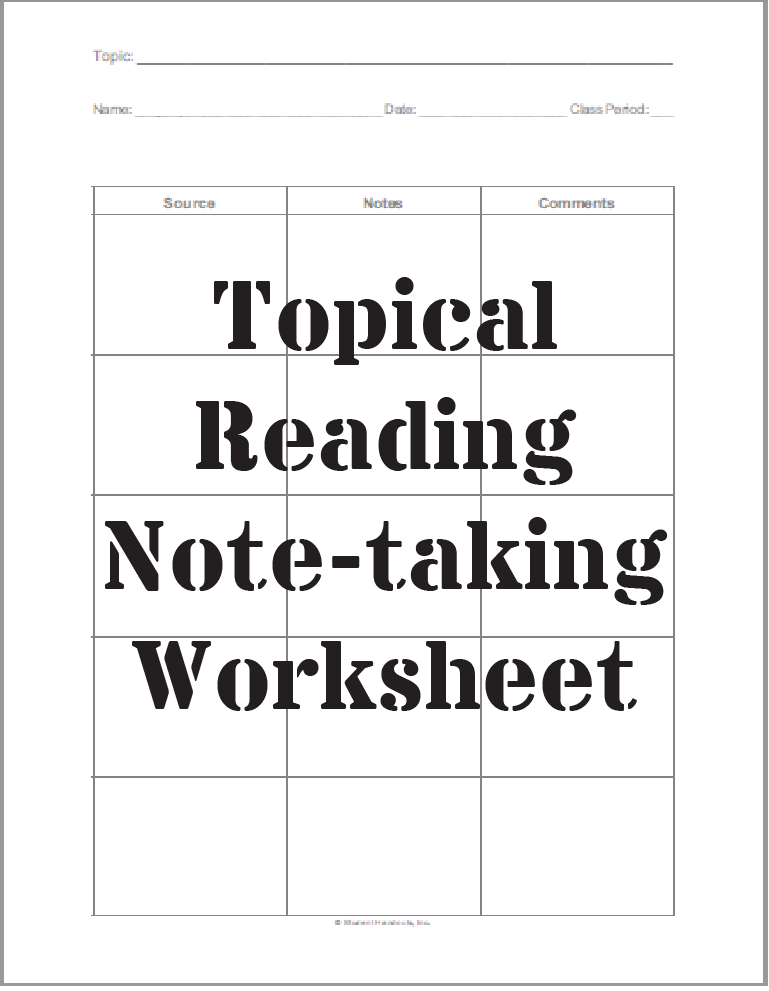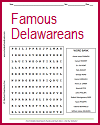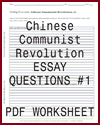Topical Reading Notes Sheet |
| www.studenthandouts.com > Social Studies > Social Studies Handouts |
 |
 |
|---|
Click here to print. This is a topical reading note-taking worksheet. This worksheet is designed for student notes on topic readings, with spaces for source, notes, and comments. |
|
Taking notes when doing topical readings is important for several reasons.
Retention of Information: Note-taking helps students retain the information they read. Writing down key points, concepts, and details reinforces memory and comprehension. Active Engagement: Note-taking keeps students actively engaged with the text. Instead of passively reading, they are actively processing and summarizing the material, which can lead to better understanding. Organization of Thoughts: Notes provide a structured way to organize thoughts and ideas. Students can create outlines, summaries, or concept maps that clarify the relationships between different pieces of information. Highlighting Key Information: By noting down important details, students can easily identify and review key information later. This is especially valuable when preparing for exams or writing research papers. Critical Thinking: Effective note-taking encourages critical thinking. Students must evaluate what information is most relevant, how it fits into the broader context, and what questions or insights it raises. Facilitation of Review: Notes serve as a valuable resource for review. When students revisit their notes, they can quickly refresh their memory and reinforce their learning. Active Reading Strategies: Note-taking is one of several active reading strategies that help students extract meaning from the text. It promotes engagement with the material and encourages students to ask questions and seek clarification. Customized Study Materials: Notes can be customized to suit individual learning preferences. Some students may prefer detailed, comprehensive notes, while others may create concise summaries or visual aids. Preparation for Discussions: When students take notes on a topic, they are better prepared for class discussions, debates, or group activities related to that subject. Their notes can serve as reference points during these interactions. Development of Study Skills: Note-taking is a valuable study skill that extends beyond reading. It can be applied to lectures, presentations, and other learning contexts, enhancing overall study skills. Time Management: Taking notes efficiently requires students to manage their time effectively. They learn to prioritize information, extract essential details, and avoid excessive note-taking, which can be time-consuming. Writing Skills: Note-taking can improve writing skills by encouraging students to condense information, use concise language, and practice summarization. Research and Reference: Notes can become a valuable resource for future research or writing projects. They provide a repository of ideas and information that students can draw upon when needed. Ownership of Learning: When students take notes, they become active participants in their learning process. It empowers them to take ownership of their education and make the learning experience more personalized. Retention of Personal Insights: In addition to summarizing information, notes can capture students' personal insights, questions, and reflections. This helps them connect the material to their own experiences and perspectives. Facilitation of Discussions: In group or classroom discussions, notes can be used to reference specific passages, quotes, or evidence from the reading, enriching the conversation and supporting arguments with evidence. In summary, taking notes during topical readings is a multifaceted skill that enhances comprehension, retention, critical thinking, and active engagement with the material. It serves as a valuable tool for both immediate understanding and long-term reference, contributing to effective learning and academic success. |
| www.studenthandouts.com > Social Studies > Social Studies Handouts |









